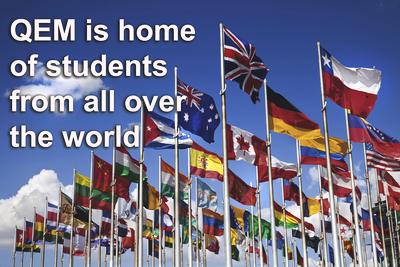Call for students application 2021/2023
Application Schedule:
- November 15th 2020 Start of the application process for the EMJMD QEM programme starting September 1st 2021.
- June 30th 2021 Deadline for the application submissions for the EMJMD QEM programme starting September 1st 2021.
- November 15th 2020 Start of the application process for the Erasmus Mundus Scholarship for the EMJMD QEM programme starting September 1st 2021.
- February 15th 2021 Deadline for the application process for the Erasmus Mundus Scholarship for the EMJMD QEM programme starting September 1st 2021.
- Scholarships Please consult
Welcome to the Erasmus Mundus Joint Master Degree (EMJMD) in Economics: Master QEM - Models and Methods of Quantitative Economics

About the QEM Master degree in Economics
The Master degree economics Erasmus Mundus QEM - Models and Methods of Quantitative Economics is a Master program in Economics co-funded by the Erasmus+ ERASMUS MUNDUS programme of the European Union. It is true joint full-time advanced Master Degree for elite cohorts of students with many specializations. Taught in English, the master program in economics is designed by a Consortium of five Partner Universities from 5 European countries with a network of Associated Partners consisting of international academic institutions as well as public and private companies.
The Models and Methods of Quantitative Economics
The course of this master program in economics offers a rigorous education in fundamental quantitative tools by combining core economic theory with related quantitative disciplines such as Probability, Statistics, Econometrics, Finance, Actuarial Science, Mathematical Modelling, Computation and Simulation, Experimental Design, and Political Science. The breadth of courses offers students the opportunity to specialise in one of these many areas in accordance with their interests along a number of course tracks. These being areas which are increasingly vital in both research orientation for further studies and in the job market for positions in government organisations, private companies or financial institutions.
The course of the master program is intended to prepare students for a wide range of careers which utilise their competency in economics, including economic theory, macroeconomics and financial forecasting, financial engineering and risk management, quantitative asset management, computational economics, quantitative trading, and applied and theoretical research. See full programme détails of Quantitative Economics Master (QEM).
A master degree in Economics for International students
Each year, approximately 50 students are welcomed to this master program in economics on the basis of academic excellence. Applicants for our master degree economics should hold a recognised bachelor's degree (or its equivalent, i.e. 180 ECTS credits in the Bologna system) and be fluent in both written and spoken English. Ideally, applicants for this master in economics will have previously studied mathematics, applied mathematics, quantitative economics or finance but candidates with other backgrounds are welcomed provided that they can demonstrate sufficient interest in economics. Mathematical aptitude as evidenced by previous studies or work experience is taken into consideration in the admissions process. Applicants for the master program in economics without the required mathematical background are advised to undertake special training or programmes prior to their enrolment in the QEM programme. Such training is proposed by the Graduate School of Mathematics of Université Paris 1 Panthéon-Sorbonne with the collaboration of Universitat Autònoma de Barcelona and Università Ca' Foscari Venezia.
Studying economics in foreign Universities
It is a programme requirement for students to study at two of the four participating universities from the Consortium. This mobility enables students to benefit from the strengths of each university on a wide range of issues, and to meet and work with professionals from various backgrounds. Upon successfully completing the programme, students are awarded a QEM Joint Degree from the partners of the consortium. The consortium provides extensive career assistance to the students, including help with internships and job placement for graduates. We have had an excellent job placement record, since 2008.
What former QEM students do now
Since its first incarnation, the Quantitative Economics Master Programme has fostered several generations of students that, with the connections these students have made since finishing the program, have already created a vast worldwide network. Students have also formed the QEM Alumni Organization, they are part of the Erasmus Mundus Students and Alumni Association and of a Facebook Group where they can be contacted. With about 700 applications per year, the successful Master students of Quantitative Economics Master (QEM) come from 49 different countries which can be seen from the map below.
For Alumni and Employability read more here

